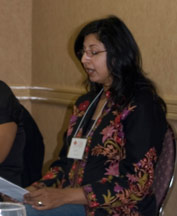This article highlights four well-rehearsed presentations at a Teachers and Students Who Stutter workshop at the CSA national conference in August 2007. The workshop took place in Toronto on August 17, 2007.
This article first appeared in the Summer 2010 Newsletter.
Sadia Khan, the first speaker, teaches elementary school near Toronto. As a child, she felt frustrated and alone when people told her to slow down, without understanding her experiences as a speaker. She dreaded using the phone, saying her name, or reading a passage verbatim in class. She often felt rushed to answer teachers’ questions.

On her first day of high school, each student in her class was asked to stand up, when their turn came, and say their name and which school they were previously at. “This was not a good start and predictably when it was my turn to speak, I stuttered. People knew straight away about my speech impediment. Some laughed, and others just looked at me. My face turned red. Then I sat down.”
Such experiences have influenced Sadia’s approach to teaching. When having her class read out loud, she tries to avoid the row style of turn taking. A more random style of turn taking helps to minimize anxiety for children who stutter. She also gives children a chance to talk about a question with the student beside them, so that they have a chance to think things over before they come up with an answer.
For teasing and bullying of children who stutter, Sadia recommends that teachers find a way to educate the class on stuttering. “Have a Stuttering Awareness Day so that all children can learn about it, and be more comfortable with it. Discuss unique qualities of students. Discuss that our differences are not bad just different. Remind the students that they would not want to be teased because of their unique qualities, so we should not tease others.”
Sadia has developed a belief in herself, and knowledge of her strengths and weaknesses. She’s learned to breathe and exhale slowly, and to slow down her rate of speech. “The advice that I would give to a student entering any grade level is just to remember that stuttering should not consume you.”
She also discussed self-talk, which might lead a person to do certain things. “In a class of students I would always tell them that we have our helpful voices inside of us, and our hurtful voices inside of us. When your voice talks to you about stuttering and it’s mean to you, talk back. Don’t listen to the mean voice, and think about things that you’re proud of.”
Scott Kerby is a high school teacher in Whitehorse, Yukon who began his career as an instructor with outdoor and leadership programs based in Toronto. His interest in helping others has been strong enough to override the challenges he’s faced as a person who stutters. “My passion for helping overrode my fear of communicating with a stutter. So I help with a stutter.”

During elementary school, he didn’t recall stuttering being detrimental, aside from answering questions in class, the dreaded public speaking contests, and talking activities where all students participate, sometimes under time pressure.
For a Grade 5 public speaking contest, his teacher asked him if he wanted to do his speech in front of her, after school, or in front of the class. He took the first option, and stuttered significantly. “To this day I wish I had taken the second option, and given my speech in front of my classmates, stutter or no stutter. It was one of my earliest recollections of the dynamic of avoidance behaviour, and the relief of avoiding something, coinciding with the feeling of loss of control.”
When he entered high school, Scott became more aware of his stuttering especially in situations such as asking and answering questions, introductions, and class presentations. “Outside of class, I don’t think it significantly influenced my social behaviour. Sports were a great outlet for me, and I became involved in intramurals, rugby, and cross-country running.”
A pivotal event occurred in Grade 10 when his geography teacher pulled him aside after class and talked about stuttering and speech therapy. “This candidness was the exception, but greatly appreciated.” This teacher stood out, in his interest in the well-being of a student beyond the course curriculum. “He was definitely a role model for me.” Scott had started speech therapy in elementary school but had not learned to use his fluency techniques. “I think I was too young and too rambunctious to be concerned with my speech.” In high school, he began to apply what he’d learned.
“My stuttering has taught me the importance of patience and perseverance, which are two qualities that have aided me in my work with all students, including students who stutter. I have been told that my stutter has also been a teacher in itself, to educate others about the importance of accepting diversity, patience, and looking at the whole person."

Shawn Cavanagh and Sadia Khan both teach at the Peel District School Board. As a child, Shawn stuttered severely but was a relatively happy and active child. Stuttering didn’t bother him in the early grades.
“Everything of course changes in high school and adolescence. It was only then that the true impact of this, um, healthy challenge that I have, dawned on me.” Fortunately in high school Shawn also found a healthy outlet in cross-country and distance running. “This brought a tension relief which I really needed. It was also a big positive.” His Grade 8 homeroom teacher and an English teacher also inspired him.
After high school, he decided to take a year off before attending university. “I decided that I needed a year off to regroup and decide what I wanted to do. Of course, I was just hiding at this time.” On the first Tuesday after Labour Day of 1984, he knew he’d made a big mistake. “I knew at that time that … only by facing fears, you’re able to get through them.”
In Grade 13 he’d taken a speech therapy course and would also read an hour a day, very slowly, practising his breathing. In university he continued to run, and began coaching part-time. An aptitude test in university pointed toward a teaching career. Initially, he decided to take another year off to regroup. Once again, however, he knew that was a wrong course of action. He knew he had to plunge ahead. He went to teachers college.
October 2007 was Shawn’s eighteenth anniversary of working as a teacher. He’s faced hurdles including interviews, being comfortable talking in front of a group, and speaking at assemblies. “But I’ve learned that for me, no matter how difficult it is, it’s the only route that I have.”
He can’t stress enough how important it is to find something positive that you love to do. “I love to run, I love to read, but I think it could be music, whatever it is – define yourself that way, with the positives in your life, not with the negatives in your life.”
In closing, Shawn spoke of being on an airplane in August 2006 on his way to a teachers conference “when an older gentleman approached me, and said, ‘Do you know who I am?’ I said, ‘Yes, you’re James McGrath and you’re my English teacher from high school, and I’m a teacher too.’”

The final speaker was Thomas Klassen, an associate professor of political science, public policy and administration at York University. While he doesn’t have memories of stuttering being a big issue in primary school, that changed once he got to high school. He seldom spoke during those years.
“When I got to university I guess school became a bit more fun, because there were different ways to show what I was capable of. As opposed to having to read a passage in class, I could write an essay on my own. I could do things that didn’t require talking.”
“I didn’t really have an interest in being a teacher, although interestingly people often told me I should.” After university, he worked for ten years as a senior policy advisor for the Ontario Government, and “through a long story which is far too long to share with you today, I ended up as a university professor.”
He teaches big classes of 100 to 150 students, and small classes of three students. As is the case with some (not all) teachers who stutter, Thomas make a point of divulging that he stutters in the first class of each of his courses, “because it’s the easy road for me.” Telling his students that he stutters takes the pressure off and he doesn’t worry when he does stutter.
He always takes a look at the confidential course evaluations that students complete at the end of a course. “It was really surprising, when I first started to teach, that almost no students had anything to say about stuttering. And it wasn’t like there wasn’t any stuttering, because I knew there was. And then students who had something to say about my stuttering would say things like, ‘Well, sometimes he stutters; I’m glad he speaks slowly.’”
“I discovered,” added Thomas, “they don’t care about stuttering even if I have more severe blocks. They can say, ‘Well, that’s Tom, that’s our prof.’” His colleagues haven’t spoken with him about his stuttering either. He assumes they’re concerned with their own careers, and they don’t care if he stutters or not.
“So I personally wouldn’t have predicted I would be a teacher. If you asked me in high school, I’d say, ‘I can’t speak, how can I teach?’ Over time, I guess it turned out to be the case that it didn’t seem such a big deal to teach.”